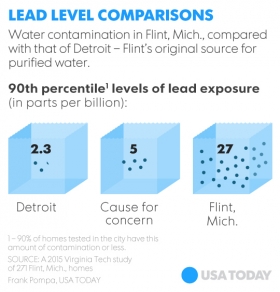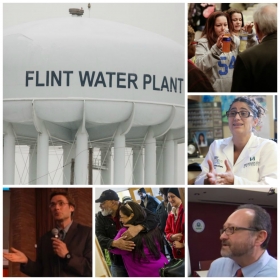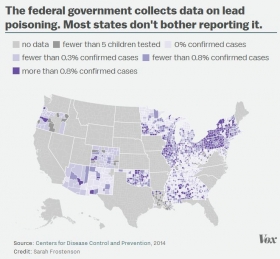This post was authored by HEFN Director Kathy Sessions.
Clean drinking water is a health essential, but too often not people’s reality. The unfolding story in Flint, Michigan has revealed that families have been exposed to unacceptably dangerous lead levels. It’s raising awareness that children are particularly vulnerable to exposures like lead. It’s eroded confidence in systems we expect to protect our health, and exposed shameful disparities in access to safe drinking water along lines of race, class, and immigration status.
Image Sources: Mother Jones, Getty
The ensuing media coverage is revealing wider problems of drinking water, lead, and other environmental health hazards in many communities.
The Flint story does also illuminate brighter lights. It shows everyday environmental health heroes making a difference by flagging and stopping harm. The situation is spurring impassioned responses and strategic philanthropy to tackle upstream environmental hazards, as a major opportunity to improve health for everyone living downstream.
At HEFN we’re working with partners to highlight needs and opportunities in Flint, and with our members on their individual and collective grantmaking.
Image Source: Vox, CDC Data
Just as the Flint story has revealed many angles of concern, funders are exploring interventions from varied angles, like:
- Improving official drinking water testing and data. There are concerning gaps in public information about water quality and childhood lead poisoning, and big questions about the accuracy of public water testing.
- Expanding community monitoring. As many people question the safety of their water, or worry about other lead exposures (like in consumer products or paint in older buildings), initiatives are ramping up to distribute lead testing kits and to share data about results.
- Supporting groups serving low-income communities and vulnerable populations, so they have more resources to organize and more voice in environmental health and justice concerns.
- Advancing research about environmental hazards, health impacts, and remediation or treatment options, often with children’s health at the center.
- Spotlighting upstream sources of pollution. The patchwork of federal and state laws ostensibly protecting drinking water – and the rivers, lakes, and reservoirs supplying it -- have gaping holes, like oil, gas, and agricultural industry exemptions from water regulations.
- Building pressure for environmental health protection and accountability. Advocates are working to strengthen health protections in water policy, and pursuing litigation to get better enforcement of existing regulations.
- Problem-solving that prioritizes health and equity, like through regional convenings or health impact assessments to look at health impacts of upcoming decisions.
If you’re a funder or donor with questions, ideas, or interests in connecting with other grantmakers in this space, email us at hefn@hefn.org. NGOs, researchers, journalists, and others with relevant resources, please feel free to share a link via HEFN’s Facebook page.




